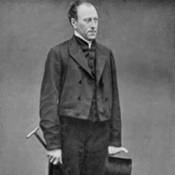
By Anonymous 19th century French photographer - Public Domain
Hector-Jonathon Crémieux
Playwright, Librettist
Biography
Hector-Jonathon Crémieux
Hector‑Jonathan Crémieux was born on November 10, 1828, in Paris into a prominent Jewish family. He initially pursued a career in law and served briefly in the Garde Mobile during the French Revolution of 1848. Though he began his professional life in public administration, he eventually turned his attention to writing and the theatre. His early work included a dramatic adaptation of Schiller’s Fiesque, co-written with his brother Émile.
Crémieux soon became known for his work in comic theatre and operetta. Collaborating with writers such as Ludovic Halévy, Philippe Gille, and Ernest Blum, he contributed libretti to several leading composers of the time, including Jacques Offenbach, Léo Delibes, and Hervé. He and Halévy sometimes wrote under the pseudonym “Paul d’Arcy,” and their partnership helped shape the vibrant world of mid-19th-century French operetta.
His most famous work is the libretto for Offenbach’s Orphée aux enfers (Orpheus in the Underworld), written in collaboration with Halévy. Premiering in 1858, the operetta was a sharp and satirical reimagining of the Orpheus myth, blending classical themes with comic irreverence. It became one of Offenbach’s most enduring works and remains a staple of the operetta repertoire.
Over the course of his career, Crémieux wrote or co-wrote more than forty theatrical works. His libretti include Le savetier et le financier, La chanson de Fortunio, Geneviève de Brabant, Le pont des soupirs, Robinson Crusoé, Le petit Faust, Les Turcs, La jolie parfumeuse, and La foire Saint-Laurent. These works combined humor, musicality, and theatrical flair, helping to define the opéra-bouffe style that dominated Parisian stages in the second half of the 19th century.
In recognition of his contributions to French theatre, Crémieux was made a Knight of the Légion d’honneur in 1864. He later retired from writing after accepting an administrative post at a financial institution. Following the collapse of that institution in 1892, Crémieux tragically took his own life. Despite his untimely death, his influence on operetta and comic theatre remains significant, and his works continue to be performed and celebrated today.
Shows
Shows associated with Hector-Jonathon Crémieux
Songs
Songs from shows associated with Hector-Jonathon Crémieux
Videos
Videos associated with Hector-Jonathon Crémieux
Quizzes
Quizzes associated with Hector-Jonathon Crémieux
Additional Information
N/A